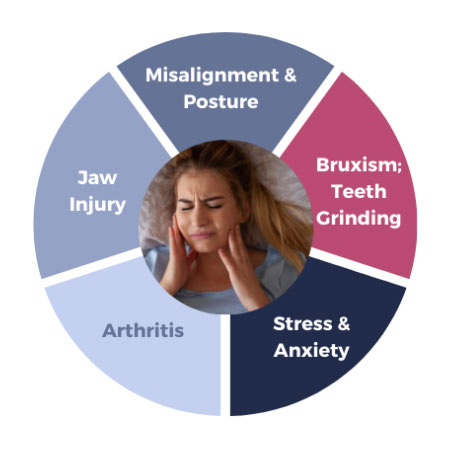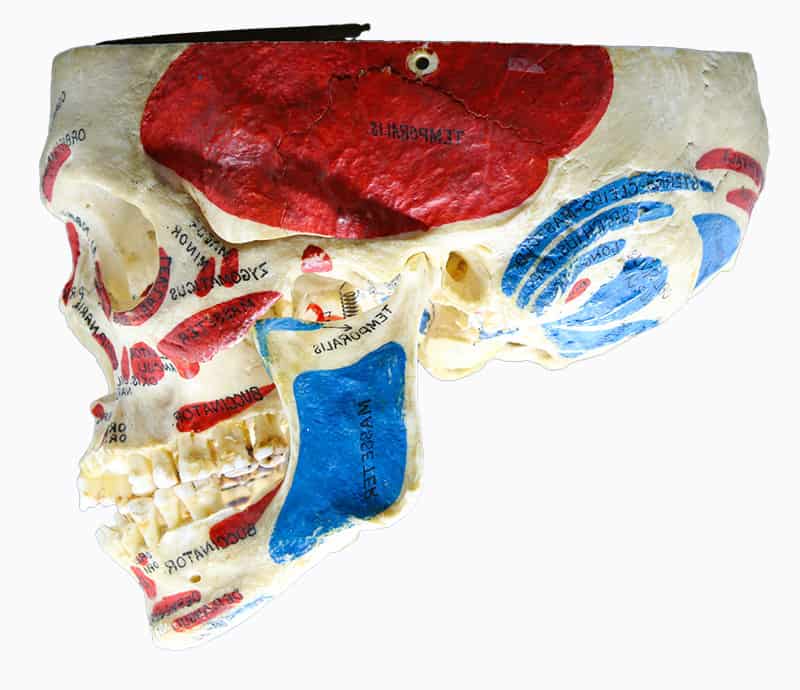Simple and Effective Solutions for
TMJ and TMD Problems
Are You Suffering from Jaw Pain, Headaches, or Clicking Sounds? Our TMJ Specialist Is Here to Help!
If you’ve noticed symptoms such as a clicking or popping sound when you open or close your mouth, persistent jaw pain, or difficulty chewing, you may be experiencing temporomandibular joint disorder (TMD). This condition can be incredibly frustrating, leading to chronic discomfort and impacting your daily life. But don’t worry—you don’t have to suffer in silence. At Advanced Dental Implant and TMJ Center, we specialize in diagnosing and treating TMJ and TMD, providing you with the relief you need.
What is TMJ? Understanding Temporomandibular Joint Disorders
The temporomandibular joint (TMJ) acts like a sliding hinge, connecting your lower jawbone to your skull. Located just in front of each ear, this joint is crucial for everyday activities such as chewing, speaking, yawning, and swallowing. When this joint or the muscles controlling it become dysfunctional, it can lead to what is commonly referred to as TMJ disorder or TMD. This condition may cause jaw pain, restricted movement, and even headaches or earaches.
Understanding Temporomandibular Disorders (TMD)
Temporomandibular disorders (TMD) encompass a variety of conditions that affect the temporomandibular joint, the muscles surrounding it, and the nerves associated with the jaw. TMD can be caused by a range of factors, including injury, arthritis, or chronic teeth grinding (bruxism). Symptoms often include jaw pain, difficulty opening or closing the mouth, and a noticeable clicking or popping sound when moving the jaw.
Top Causes of TMJ Dysfunction

TMD can develop due to several factors, and understanding these causes can help in preventing and treating the condition effectively. Here are some common causes of TMJ dysfunction:
- Loss of Teeth: Missing teeth can lead to a misalignment of the jaw, placing extra strain on the TMJ and surrounding muscles.
- Developmental Issues: Certain congenital or developmental abnormalities can affect the alignment of the jaw and lead to TMD.
- Jaw Joint Infections: Infections in the TMJ can cause inflammation and pain, contributing to TMD.
- Trauma or Injury: Direct blows to the face or jaw, as well as indirect injuries, can result in TMJ disorders. This can include whiplash or other forms of trauma.
- Poor Sleeping Habits or Posture: Sleeping in awkward positions or maintaining poor posture can strain the jaw muscles, leading to TMD.
- Teeth Grinding (Bruxism): Chronic grinding or clenching of teeth can wear down the TMJ and cause muscle tension, leading to TMD.
- Sleep Apnea and Snoring: Conditions like sleep apnea, where breathing is interrupted during sleep, can cause stress and tension in the jaw, exacerbating TMD symptoms.
- Arthritis: Certain types of arthritis, such as rheumatoid arthritis or osteoarthritis, can affect the TMJ, leading to inflammation and pain.
- Prolonged Mouth Opening: Extended periods of mouth opening during dental procedures or surgeries can strain the TMJ, potentially leading to dysfunction.
- Stress: Emotional stress can cause individuals to clench their jaw or grind their teeth, which can contribute to TMD.
- Bad Habits: Habits such as nail-biting, chewing on pens, or lip-biting can put unnecessary pressure on the TMJ and surrounding muscles.
Recognizing the Symptoms of TMJ Disorders
Recognizing the symptoms of TMD early can help in seeking timely treatment and preventing the condition from worsening. Common symptoms include:
- Persistent Jaw Pain: Pain or tenderness in the jaw, face, or neck is one of the most common symptoms of TMD. This pain may be constant or occur only when you move your jaw.
- Frequent Headaches or Migraines: TMD is often associated with tension headaches or migraines, which can be debilitating.
- Jaw Muscle Stiffness: You may experience stiffness in the jaw muscles, making it difficult to open or close your mouth fully.
- Dizziness or Lightheadedness: TMD can sometimes lead to feelings of dizziness or imbalance, making it challenging to perform daily activities.
- Blurred Vision: In some cases, TMD may be associated with visual disturbances, such as blurred vision.
- Clicking, Popping, or Grinding Noises: You may hear or feel a clicking, popping, or grinding sensation in your jaw joint when you open or close your mouth. This can be painful or painless.
- Limited Jaw Movement or Locking: TMD can cause the jaw to become “stuck” or locked in a particular position, making it difficult to move.
- Jaw Deviation: When opening or closing your mouth, you may notice that your jaw shifts to one side. This is known as jaw deviation.
- Difficulty Chewing: TMD can make it challenging to chew food properly, as the alignment of your jaw may be affected.
Keep your teeth and denture happy by ensuring healthy gums!
The Benefits of Treating TMJ Disorders

Seeking treatment for TMJ disorders can significantly improve your quality of life. The benefits of managing TMD include:
- Reduced Risk of Further Tooth Damage: Proper treatment can prevent wear and tear on your teeth, reducing the risk of further dental issues.
- Relief from Chronic Pain: TMD treatment can alleviate persistent jaw pain, headaches, and other discomforts associated with the condition.
- Improved Chewing Efficiency: Effective treatment can restore normal jaw function, allowing you to chew your food more comfortably and efficiently.
- Enhanced Enjoyment of Meals: With reduced pain and improved jaw function, you’ll be able to enjoy your meals without discomfort.
- Better Overall Quality of Life: TMD treatment can improve your ability to speak, chew, and engage in social activities without pain, leading to a better quality of life.
- Protection of Ear Health: TMJ disorders are often linked to ear problems such as tinnitus (ringing in the ears) or earaches. Treating TMD can help protect your ear health.
Learn more about TMJ
Here at Advanced Dental Implant and TMJ Center, we thrive on providing world-class care to our patients. We make sure that all our patients are comfortable and satisfied with their treatment. Dr. Adatrow is passionate about providing personalized care. He spends time with the patients, understands his patient’s condition, and recommends the best possible treatment to his patients. He has intensively trained in the University of Tennessee hospital in TMJ management. He is qualified by the American Dental Association to understand and treat TMD patients. He is the only practicing board-certified periodontist and prosthodontist in the southern United States. He has experience of more than 17 years.
Frequently Asked Questions About TMJ/TMD
Here are some common questions we receive about TMJ and TMD, along with their answers:Can I choose the type of TMJ oral appliance (splint) I want?
Will using a TMJ splint change my lifestyle?
Why shouldn’t I use over-the-counter TMJ splints?
How much does TMJ treatment cost?
Will my insurance cover TMJ treatment?
Is trauma linked to TMD?
What are the psychological impacts of TMJ?
How do habits contribute to TMJ disorders?
Is TMJ more common in women?
Book An Appoinment
Ready for a New Smile?
“Ready for expert dental care? Book your appointment today at Advanced Dental Implant and TMJ treatment Southaven, MS. Our specialists provide top-tier treatments, from dental implants to TMJ solutions. Convenient online or phone booking available!”
